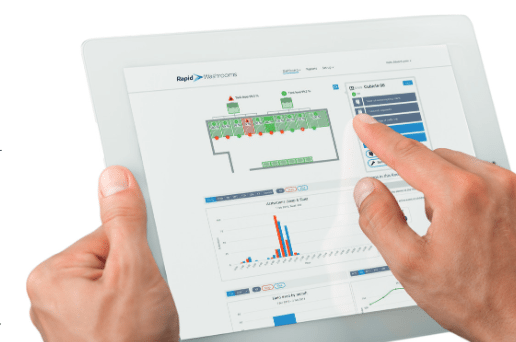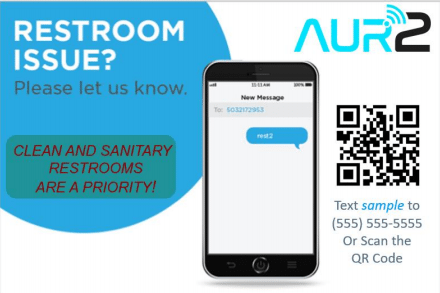How many times have you been in a public place — a restaurant, train station or even at the office — and found the restroom lacking? Maybe there’s no soap or paper towels, or the sanitary product machine is jammed. Worse, what if it’s dirty or clogged or stinky?
From a user point-of-view, it’s bad. From a business point-of-view, it can be disastrous. Bad restroom experiences can affect the bottom line more than you think: In a Harris Interactive poll, 94 percent of respondents said they would avoid returning to a business with a dirty restroom.
There is a tried-and-true solution: The restroom attendant, ensuring guests have a comfortable experience, everything stays in stock and it smells fresh and clean at all times. With that not an option for many businesses, IoT startup AUR2 (pronounced “Artoo”) wants to establish itself as one of North America’s major “smart restroom” companies.
“What it comes down to is a lack of resources,” said AUR2 founder Aaron Glazar. “If a business has the ability to put an employee in that restroom frequently, it’s not a complex problem to take care of. The problem doesn’t come into play until you realize that many businesses can’t afford to have a person in their all the time. And that’s where the technology comes in.”

The technology was developed by U.K.-based Rapid Washrooms. It’s already being used in places like London’s Heathrow Airport, but it’s only just starting to be installed in the U.S. One of AUR2’s early clients is Christiana Mall, which will have smart restroom technology within the next year.
Glazar didn’t come into the business of of clean bathrooms by accident — cleanliness is his family business. Glazar’s father, Alan Glazar, founded the janitorial supply company Action Paper & Chemical Co. in 1982. Action is still very much an active business, serving Delaware and the surrounding region, with AUR2 as an offshoot with a much larger sales territory.
“In the past several years we’ve been doing some soul searching, seeing what it is that we’re going to be doing to help build a sustainable future for the company,” said Glazar. “As a result of that, we got on this path of developing innovation to bring to the marketplace. We looked for challenges in the marketplace that are either going completely unsolved or currently being solved but there might be a better way. That’s what put us on the path of what is today AUR2.”
So, what is a smart bathroom, anyway? And why shouldn’t the idea terrify you?
Basically, a smart bathroom uses technologies that keep track of paper and soap usage, toilet flushes, sink usage. Systems collect data on the flow, and make sure everything stays clean and stocked. None of the data is personal, and no video or photography is involved. The tech cares about a clean restroom, not you.
Some of the features would be noticeable, such as red occupied lights on stall doors (something that seems like it should already be common), and pleasant aroma released when the toilet self-cleans. Most won’t make an obvious difference — but it will keep the restroom in the clean state customers expect, Glazar says.

For smaller businesses, like Newark’s Cafe Gelato, where a full smart restroom may not be feasible, clients can utilize AUR2’s less expensive customer feedback system, where customers can use their phones to report a problem with the restroom, which will be delivered to a manager immediately, allowing them to fix the issue before more customers are impacted.
“I think everyone can relate to that basic experience where you’re out with a group of people, someone from the group goes into the restroom, and they come back shaking their hands, saying ‘I can’t believe this, they don’t have any paper towels,'” said Glazar. “We looked at why these situations exist, and by making data visible, we can put the necessary information into the hands of the ones who need it.”
Public bathrooms that are always clean, stocked and sweet smelling? We could see that catching on.







